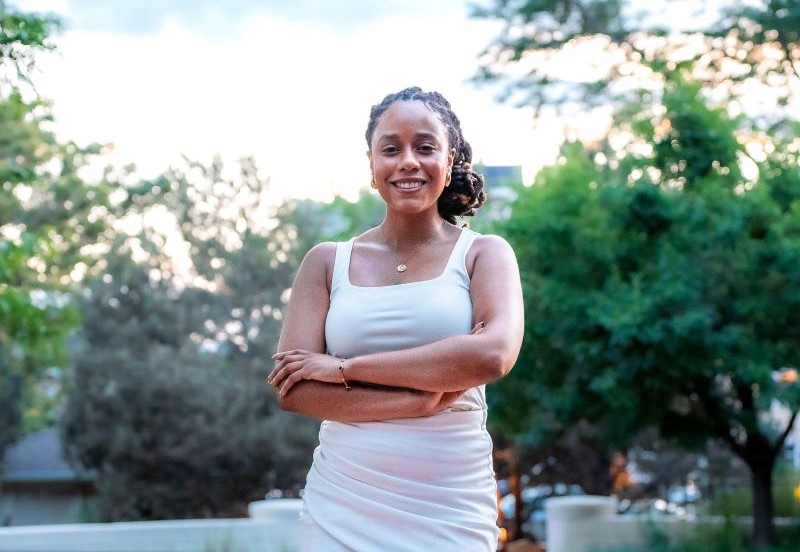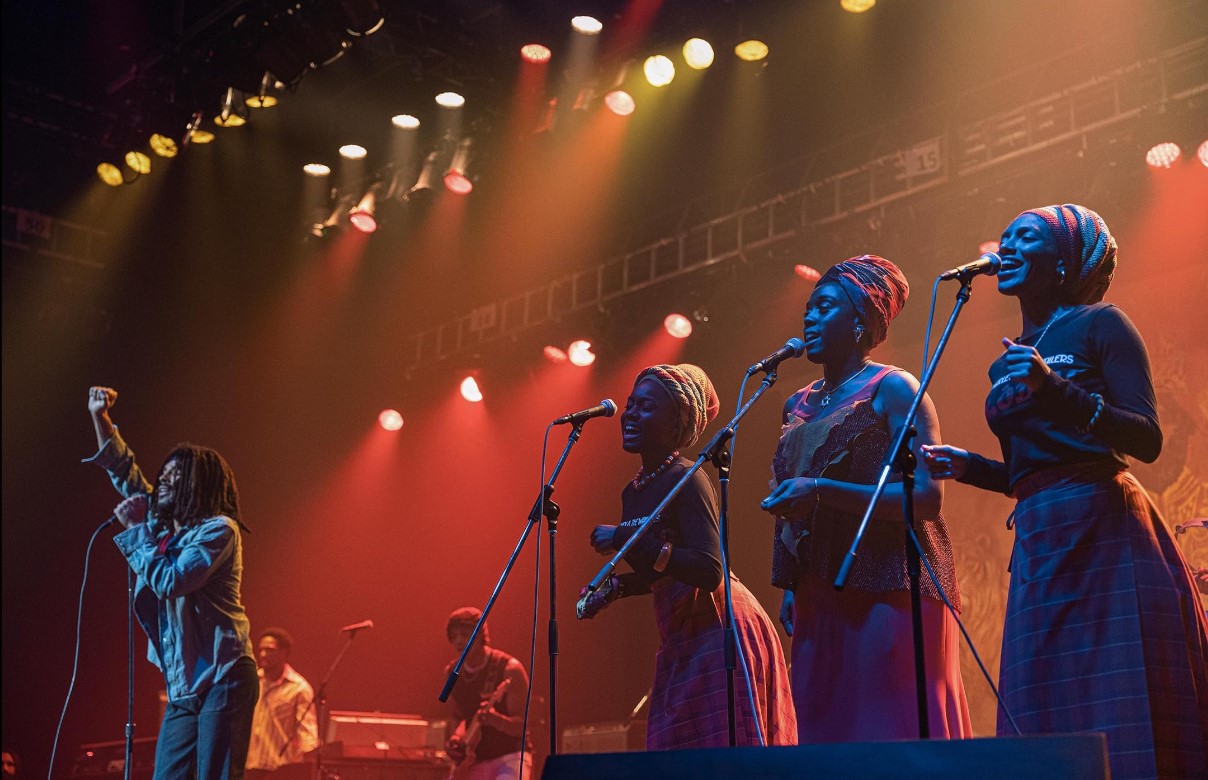“Bob Marley: One Love” by “King Richard” and “Monsters and Men” director Reinaldo Marcus Green hit the big screen on February 14th, 2024. The film is about the legacy of Bob Marley and his groundbreaking music, and also highlights his relationship with his wife Rita Marley. Influenced by my family’s love for Bob’s music, message, and benevolence, I volunteered as a gardener at the Bob Marley Mausoleum during the summer of 2022 and revisited the compound that December. Tending to the burial grounds of Bob Marley, his mother, Cedella Marley Booker, and other family members, was an extraordinary experience of honoring the dead. Inspired by the film and Women’s History Month, I am writing in the interest of highlighting the magnificence of the unsung heroes around his impact: the women who support his legacy. In the film, Rita’s legacy is portrayed as a lifelong loyalist of Bob’s worldly impact despite his lack of loyalty to her, and in reality, she is the foundation of his work. Many women carried his messages, and his children still work tirelessly to further his name.
Bob’s life began in the village of Nine Mile, in St. Ann’s Parish, which is mentioned briefly in the introductory written narration in the “One Love” film. Here, I will honor the living who are working at the Bob Marley Mausoleum in St. Ann’s Parish and working internationally to continue the “One Love” narrative.
Bob was a complex man, his messaging outlasting his patriarchal life, and the women who are carrying his legacy have the privilege of living long and in the truth of his songs.

“We’ll be together/with a roof right over our heads”
As I walked up and down the hills of Nine Mile in St. Ann’s Parish, I was greeted by women old and young who were friendly and dedicated to the villages’ upkeep. Distant relatives of Bob Marley and community members alike work to maintain the Bob Marley Foundation that holds burial grounds, Cedella Marley’s home, and the childhood home of Bob. Because of the work of Ms. Elaine Martin, the compounds’ former cleaner, and Janice Malcolm, who works as the on-the-ground operations manager, international travelers are able to have a smooth experience when traveling from different corners of the earth to pay homage to the reggae superstar. Marian Wray, the main singer on the compound, serenades the mausoleum guests with renditions of Bob’s songs, while Keneisha’s herb cake is sold to lovers of baked goods. Bob’s mother, Cedella, is carried by her own legacy of music and her famed sauces that are loved internationally and managed by her daughter-in-law.
It is admirable that these women, who are not hardened by their lack of recognition in pop media, stand proudly next to their work in building businesses, families, and villages, and often work in tandem with each other, because they know that they bear the brunt of effectiveness, and that their dedication may never receive an audience-wide applause.
The Marley family is very large and members of the family carry his legacy in their own ways. Some of his grandchildren and nieces are singers, like Mystic Marley and Selah Marley, while others are dedicated to academia, like Zaya Booker, and fashion, like Justice Marley. Historic in their own right, his female grandchildren and nieces are beautifully gifted and shine their own brilliant light.

“I want to give you some good, good lovin’”
The film portrays Rita as Bob’s background singer, confidant and mother to children who were hers and those she inherited through infidelity. Rita supported Bob on international tours and in raising children while pursuing her own music career.
Lashana Lynch, who plays Rita Marley in “One Love,” exudes Rita’s aura perfectly. The audience feels her longing to be a good friend to Bob, while also feeling the sensitivity around her frustration of being his soldier, too. A Rastafarian queen, Rita exemplifies audacious love, and Lashana gives her character justice.
While staying on the compound, I noticed that the work of the women was expected to be consistent, but not praised loudly. As a cultural observer volunteering on the compound, I always wanted to shout “These women deserve more!” but I was merely an observer. I felt spiritually connected to Cedella Marley Booker, born July 23rd, and Rita Marley, born July 25th, because my birthday is July 24th. Unbeknownst to me until I arrived at the compound during the month of our birthdays, that history inspired me to host a “Leo” celebration in their honor for the entire village to eat, drink, dance, and be merry in light of the work that those women had accomplished. I did not know how hard it was to feed and uplift a village for just one night, and after doing it, all I could do was shout “These women deserve more!” More money, more hugs, and more international praise.
“None but ourselves can free our minds”
After spending a few months amongst the Rastafarian people of Bob Marley’s birth and resting place in St. Ann’s Parish, coined “Reggaeland,” I learned a substantial amount about the religion and political movement.
Like most major religions with a hierarchical man god, Rastafarianism is based on Ethiopian leader Haile Selassie I, who is believed to have returned to redeem all Black people. Religion based solely on the idea of one all-powerful man is often discriminatory in nature towards those who identify as women. Known to be a bit patriarchal, Rastas are dedicated to their hair, the food they eat, and hypermasculinity. Rastafarian women are housekeepers, nannies, teachers, healers, soldiers, and businesswomen, who occasionally rest to have a smoke and banter.
While working on the compound, some of my favorite moments were when it would rain or become too dark to do yard work and all I could do was listen to stories in patois, spoken by both women and men. Janice, who worked alongside Cedella Marley until her death, raved about traveling with her and rolling joints for her. She adores the legacy of Cedella Marley, and excitedly talks about the work Cedella did for school children, village members, and her own children. Ceddy, Janice’s niece and namesake of Cedella, is one of the eldest girl grandchildren living in the village of Nine Mile, and she stands proudly as a leader of the other children and as a child historian, knowing stories and songs of Bob and his mother.
Although it has been nearly two years since I visited Nine Mile, when I call the women of Reggaeland, they tell me stories of how they are building properties in the village, starting new businesses on their own, and continuing to work for the Bob Marley Foundation. They do not stop. They find new ways to create and celebrate. They lead with the most thoughtful and charismatic energies. The ways that we view the spirit of Bob Marley are the actual methodologies of the women uplifting him posthumously.
Women are the hardest workers on the planet, and in St. Ann’s Parish, the women continue to carry the legacy of Bob Marley gracefully. Bearing children, assuming responsibility of nieces, nephews, and grandchildren, and leading family businesses is just a portion of their communal work and impact. Community leaders often nurture “great” men, and in the case of Bob Marley, his messages are nurtured by generations of women community leaders.
Cedella, Rita, Janice, Ceddy, Elaine, Marian, Renia, Crystal, Lauryn, Ella, Bella, and countless other women around the world carry legacies, messages, music, and ultimate spirituality with apparent ease. Bob Marley’s music, tonality, and intention has been carried beyond his lifespan by these women.












